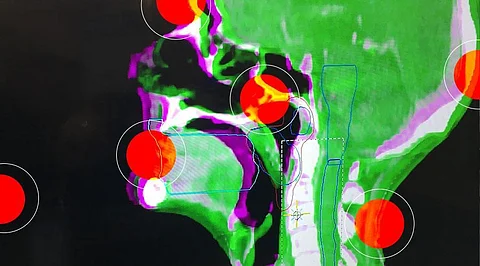

Indian researchers have developed an artificial intelligence or AI model to predict Cancer and whether substances have the cancer-causing ability. Called Metabolkiller, they say that the AI tool can be path-breaking for the food and drug industry to predict the carcinogenicity of new molecules instead of finding out after long-term use.
"Whenever companies formulate something new – be it chips or cosmetics – they have to ensure that the ingredients do not cause cancer. Similarly, medicine manufacturers also conduct tests to ensure they are not going to cause cancer. In the last few decades, more than 750 FDA-approved drugs have been withdrawn from the market because it was found that they were inducing cancer," said Dr. Gaurav Ahuja, one of the researchers at IIIT Delhi involved in the study.
But this is not the first time, Researchers at the Indian Institute of Technology Madras have developed an artificial intelligence tool that can identify cancer-causing genes. The AI tool, "Pivot", can predict cancer-causing genes in an individual thus assisting in not only reducing the side effects of drugs but also in better recovery for patients.
The researchers have used prediction models for breast invasive carcinoma, colon adenocarcinoma, and lung adenocarcinoma. They plan to extend it to other cancers. The aim is to find ways to provide personalized cancer treatment strategies.
The model uses information on gene mutations, gene expressions, and number variations in genes and perturbations in the biological network owing to an altered gene expression. Chemical engineering professor Raghunathan Rengaswamy led the research. D. Karthik Raman, associate professor, Bhupat and Jyoti Mehta School of Biosciences in the institute, and Malavika Sudhakar, research scholar, were on the team.
According to The Indian Express, the researchers claim that the model is a game-changer when it comes to carcinogenicity prediction because it looks at six distinct biochemical responses instead of just the chemical properties of the substance.
"Traditionally, any artificial intelligence model for cancer prediction depends on learning from the already known carcinogens. Think of these algorithms like a Google search – when you are looking for something, it searches its database for that thing and if it isn't there, shows you the closest result. However, the 2,000 or 3,000 carcinogenic molecules that we know about aren't enough to train an algorithm, resulting in lower accuracy," said Dr. Ahuja. "While we were developing our model, we thought about whether we could bypass this shortcoming. What if we didn't depend on just these 2,000 to 3,000 known carcinogens? So, instead, we trained our model to recognize six biochemical processes that usually take place in cancer cells," he added.
Metabokiller is trained to figure out whether a molecule can cause six such biochemical processes associated with cancer. First is electrophilicity, which checks whether the molecule carries a positive charge. Dr. Ahuja explains that by nature DNA, be it human, primate, or any other animal is negatively charged. Hence only a positively charged molecule can be attracted to it and attack it, thereby leading to cancer. Secondly, Metabokiller tests the ability to induce proliferation or rapid growth in the cells that are seen in cancerous growth. Third, it looks for the oxidative stress the molecule creates.
The fourth process that Metabokiller looks for is genomic instability or the ability of a molecule to damage the DNA. The fifth is epigenetic alteration – "Some molecules may not change the genome sequence of the cells but can lead to epigenetic changes. To explain, think of a gene that, say, gives me long hair. Now, a molecule can prevent the long hair by either damaging the gene or through epigenetic changes, turning it off, which means the gene remains unharmed but it doesn't work."
The last process that Metabokiller looks for is an anti-apoptotic response – the ability to prevent cell death even under stress (such uncontrolled growth of cells is what leads to cancer).
After checking for the six processes, the algorithm assigns a prediction score to any molecule. "Anything over 50 percent is worth validating through the standard experiments for identifying any carcinogen."
Join our WhatsApp Channel to get the latest news, exclusives and videos on WhatsApp
_____________
Disclaimer: Analytics Insight does not provide financial advice or guidance. Also note that the cryptocurrencies mentioned/listed on the website could potentially be scams, i.e. designed to induce you to invest financial resources that may be lost forever and not be recoverable once investments are made. You are responsible for conducting your own research (DYOR) before making any investments. Read more here.
